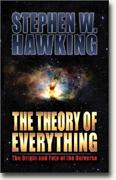The Theory of Everything
Stephen W. Hawking
book reviews:
· general fiction
· chick lit/romance
· sci-fi/fantasy
· graphic novels
· nonfiction
· audio books
· author interviews
· children's books @
curledupkids.com
· DVD reviews @
curledupdvd.com
newsletter
win books
buy online
links
home
for authors
& publishers
for reviewers


|
The Theory of Everything: The Origin and Fate of the Universe Stephen W. Hawking New Millennium Press Hardcover 167 pages June 2002 |
|
Well, we'll get to that a bit later. The first thing one realizes in reading these lectures is how often the word "assume" is used. E.g., "If, therefore, we found such stars in another galaxy, we could assume (my italics) they had the same luminosity." And further on: "The only reasonable explanation of this was that the galaxies were moving away from us..." (Another assumption). So a lot of guessing is going on. In fact, the Big Bang theory seems to be based on the assumption that everything -- stars, galaxies, etc. -- are moving away from us, i.e., the universe is expanding. So it doesn't really take much imagination to reason backwards and say that since everything is moving away from everything, at one time everything must have been closer together, and at a time before that they were closer still. If one keeps going backwards in this way one arrives at a point where everything was together, i.e. everything was "one thing" before expansion began. What caused the singularity to begin expanding? The Big Bang, of course. But is that an answer? When one examines it, it is not really an answer at all. No one knows what caused the Big Bang. Nor can science say what created the singularity that existed before the Big Bang occurred. So there we are, back to the question of: "Who created everything? Who or what is the "first cause?" The Big Bang is not the true answer, since something must have preceded it. A shocking confession (or at least it seems) is made by Mr. Hawking on page 107 where he states: "It would be very difficult to explain why the universe should have begun...except as an act of a God who intended to create us." (my italics) So, after all this science and all the assumptions, Hawking (and, I assume, other scientists) are drawn to the concept of God as an answer. True, Hawking almost immediately says "to avoid this difficulty" other theories had to be created, but it seems a tremendous confession that a scientist and atheist makes such a statement at all. The Theory of Everything would be well read by those studying religious theory and philosophy as well as those interested in physics. It is a book that should get anyone interested in questions such as "Why does anything exist?" and "Is there a God?" thinking. It should offer comfort, too, to those religious people who do believe in God, to learn that science hasn't really found anything to conflict with their beliefs in any meaningful way. The title, by the way, refers to the scientific desire to formulate one single theory that explains "everything." The Theory of Relativity can only explain certain things, and other theories can only explain certain other things. The search is on for an all-inclusive theory that explains everything. Right now, as Hawking says, such a theory is only a scientific dream. © 2002 by Mary B. Stuart for Curled Up With a Good Book |
|
|
|
 Click here to learn more about this month's sponsor! |
|
| fiction · sf/f · comic books · nonfiction · audio newsletter · free book contest · buy books online review index · links · · authors & publishers reviewers |
|
| site by ELBO Computing Resources, Inc. | |
 In the lectures, Mr. Hawking explores the history and the current status of modern physics. Anyone interested in science and physics should of course grab up this book, but it
should be of interest to many others, especially those people interested in the concept of God,
for it is in modern physics that science and theology overlap most dramatically.
Physics is ultimately interested in the beginning of the universe (among other things) and this brings it to the same question philosophers and theologians have pondered for centuries: Who
-- or what -- is the "first cause?" Or, said another way, "Who or what created everything?" Religious people say God. What does Mr. Hawking,
whom I believe is a declared atheist, say?
In the lectures, Mr. Hawking explores the history and the current status of modern physics. Anyone interested in science and physics should of course grab up this book, but it
should be of interest to many others, especially those people interested in the concept of God,
for it is in modern physics that science and theology overlap most dramatically.
Physics is ultimately interested in the beginning of the universe (among other things) and this brings it to the same question philosophers and theologians have pondered for centuries: Who
-- or what -- is the "first cause?" Or, said another way, "Who or what created everything?" Religious people say God. What does Mr. Hawking,
whom I believe is a declared atheist, say?